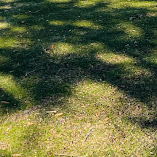around and over lumps in earth’s carpet,
and the mini wetlands cradled between them.
He looks up toward his goal:
the paved parking lot beyond this green expanse
that separates it from the gravel trail to its north.
Maybe a hundred yards of earth,
a shortcut through spring.
He recalls the exhilaration of his childhood’s spring,
felt for all its confidence and hope.
Now above all else he fears falling.
But he needs to be here—
this sun, this air,
these birds singing spring into being on this grass.
Now! A new green—a shiny, flashy
glint of green—spikes his eyes.
He focuses just ahead where,
in the grass, a broken shard of a bottle
—a Coke bottle, the old kind?—
hides among the blades.
He stops, examines it and its surroundings.
Experience teaches that where there’s one glass sliver
there certainly lurk two and three and more.
As there are, as he knew there would be.
He winces: behind his eyes he sees
a barefoot child (not a care in the world!)
outrun their parents into the grass
only to stab their foot upon glass
and bleed and scream…
…and, the man hopes, to be comforted by love.
Calmed.
(He does not know that child.)
What will he do? For the good of that child
he will remove the glass from the grass.
He can balance three, maybe four, pieces
between his left hand’s thumb and fingers,
make his way to the parking lot,
then cross it to the trash can framed by parked cars.
Steadied by the cane in his right hand, he bends his lanky frame,
picks up first, one piece, then two more.
He clasps them as best he can,
then steps out—so carefully—maintaining
just the right amount of pressure on the hurt he carries.
Walking these last few yards he sees still more glass
strewn randomly, as if on purpose,
here and there in the grass along his way.
A car is parked on the lot’s near side,
motor running, person sitting at the wheel.
Will they notice me and wonder what on earth I’m doing?
Why, at my age, my cane and I are doing it?
Is not this cane problem enough for me, and my years?
On the far side two figures sit inside
another car flanking the trash can,
its rap deafening them to birds’ songs.
They must see him open the trash can’s cover
and drop something small and green into it.
Look at that strange old man.
Done, should he do more?
More glass is out there. He saw it.
If he has saved the child
from the cut of the glass he’s carried away,
their foot could still land on what he left behind.
Well, he couldn’t get it all even if he were
fifty years younger a man. No sense trying.
And anyway, he needs something to carry
all these pieces in. He can make only so many trips.
His car’s trash container is lined with a plastic bag.
He yanks it out, balls it in his left fist,
and carries it back across the lot and into the grass,
where he stops to wonder where
the glass he saw not a minute ago has gone.
How foolish, this old man!
No rightly-thinking one would do this.
But he would, and is—a lesser good deed
than some he might have done in younger years, he knows.
Yet a good deed, foolish as they can be.
He finds caches of shattered Coke bottle glass
scattered all around in small piles,
even the bottle’s bottom cradles its top,
as if buried together.
This park’s mine field is no accident.
He finds what he finds without going far—
he collects enough to make him feel good about his day
walking and enjoying spring,
asking how many he has left to enjoy
before spring and he disappear in the march of change and time.
He puts his retrieved green glass into the bag
with the candy wrappers already there,
and carries it all back to and through the lot,
passing slightly amused drivers,
and lowers it to the floor beneath the seat
the passenger would sit in if he had a passenger.
He drives home, where he feels just okay about his little good deed
as he deposits the plastic bag of glass and wrappings
into the trash can in his garage.
Will this old man’s way
save a child from at least one
of the dangers of life?
No one will ever know.
As this old man will never know who
will pick up after him, or what.
Broken.
Sometimes—he reflects to himself that evening
because the glass in the grass is his secret—
sometimes all he can do is pick up shards
and hope he's found enough of them
to save another from his pain.
(Keith Dean Myers)

No comments:
Post a Comment